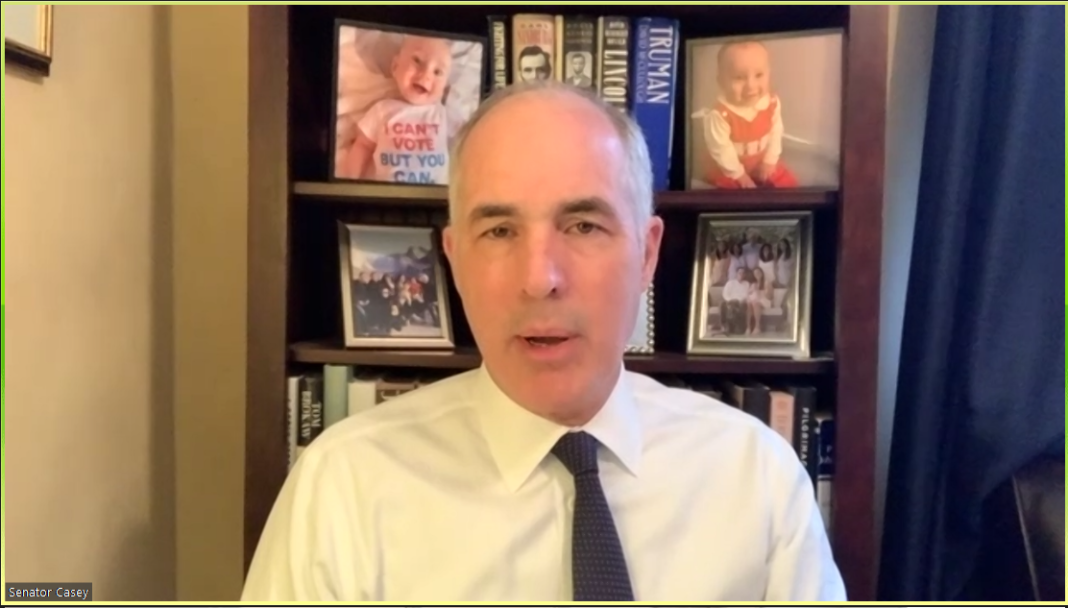Slippery Rock University resumed its speaker series Wednesday morning with U.S. Sen. Bob Casey to engage in civil discourse with the SRU community and upend misinformation in the wake of the Capitol riots earlier this year.
Before diving into the Q&A, Casey said he wanted participants to walk away energized to seek out public service roles.
“I’ve found that when you serve, you are enriched in one kind or in one way or another,” Casey said. “Not enriched financially, necessarily, but you’re enriched in terms of your sense that you have contributed something to the world.”
SRU President William Behre, the moderator, presented questions to the three-term senator submitted by the campus community. Behre, who in a previous email to SRU staff said he was “shaken to [his] core” after witnessing the riots on Jan. 6, asked for the senator’s thoughts on creating compromise among different groups.
The current divisions in the nation appear to be more evident than at any other point in history, caused by an intertwining of ideology and party, according to Casey. The intolerance from that ideology is seen more on the Republican side, the Democratic senator said.
“They don’t like me saying that, but this is meant to be an honest discussion, not a warm and fuzzy fantasy because we have divisions,” Casey said. “And we have to express our views about how those have played out.”
Casey added that he did not “absolve” himself of any responsibility, and that he would continue to do more to work with Republicans to get bipartisan support on at least one bill.
Continuing discussion on the current political divide, the senator was asked what SRU could do to combat the narrative from conservative voices discouraging young Americans from attending college because of their presumed liberal bias. For Casey, that argument from conservatives is misleading.
“On every campus, there’s going to be at some point in time, a point of view of one kind or another,” Casey said. “But I would say to someone who is maybe more conservative than I am… the main reason you’re there, at that institution… is to get a good education.”
Casey added that attending a university that may not hold a person’s same leanings will only make the student a better debater. Discussing those positions with faculty or other students who may disagree can provide training in “political combat” for those who will want to pursue a career in politics in the future.
The senator was also asked how a young student who is interested in running for local office under a political banner that is not the majority in the district can be successful. While running for a local office was not something the former Auditor General of Pennsylvania had experience with, he advised that truly wanting to serve in the position and knowing everything about it can make the uphill battle much easier.
Other tips offered to new candidates were setting a budget and fundraising. While local elections usually do not see high dollar amounts raised compared to state and federal races, fundraising helps candidates receive funding while also getting community members to promote them, Casey said. He added that while he would rather be out knocking on doors and talking to people, fundraising is one of the necessary things a candidate must do if they want to win, but luckily it is much easier now than when he first ran for office in the late ‘90s.
“In fact, your generation has advantages on fundraising that frankly, I didn’t have, because in the old days, meaning 1990s … you couldn’t raise money online, through the internet, or through the connection you make to people through social media,” Casey said.
Casey, who worked to get the Campus SaVE Act passed in 2013, talked about what more can be done at universities to protect students from sexual violence. While the senator recognized that sexual violence affects everyone regardless of gender, combating the problem on campus is a responsibility of both the university and male students, he said.
“I’m talking to the guys, now, this is a guy problem, and guys have to be part of the solution,” Casey said. “You have an obligation to do what you can to try to stop sexual assault.
“And part of that is if your friend is talking about engaging in this kind of conduct… if your friends are making statements about it, or hinting at it, or telling you stories about it, you have an obligation to intervene.”
While the senator wants to see universities doing more, including bystander education so students have the skills necessary to intervene when they see something wrong, Casey doesn’t think the federal government should step in with unified definitions regarding sexual assault and should leave it to the states to define those crimes.
After his visit, Behre said he was thrilled to have Casey visit because it provides the senator and students to share their perspectives. After having high-profile speakers like Casey and U.S. Poet Laureate Joy Harjo, Behre said many are inspired to continue inviting others to Slippery Rock. His office has already reached out to Pennsylvania’s other senator, Sen. Pat Toomey for a visit.
“Speakers like Sen. Casey and Joy Harjo elevate the quality of our dialogue and help us to think about important issues in new ways,” Behre said. “This strong conversation is key to making sure that the university remains a forum for civilly sharing ideas.”








